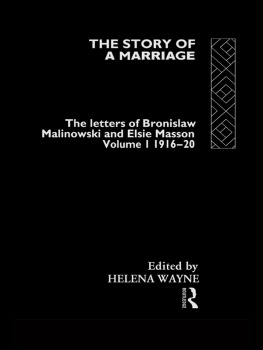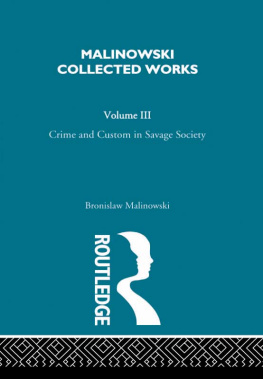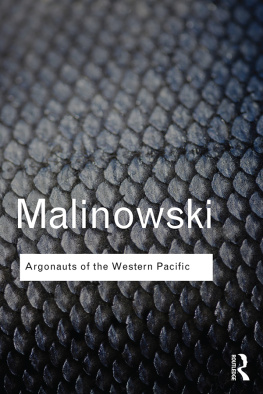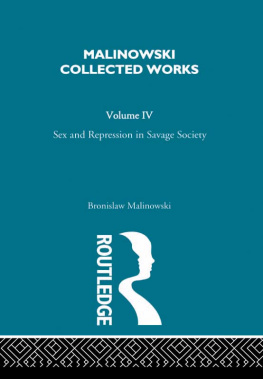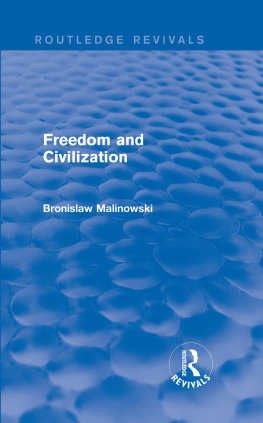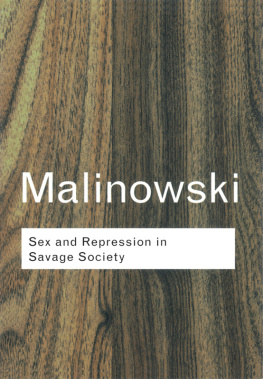
Routledge Revivals
The Ethnography of Malinowski
Bronislaw Malinowski is one of the founding fathers of modern social anthropology and the innovator of the technique of prolonged and intensive fieldwork. His writings about the Trobriand Islands of Papua were in their time the most formative influence on the work of British social anthropologists and are of perennial interest and importance. They produced a revolution in the aims and field techniques of social anthropologists, and the method he created is that now normally used by anthropologists in the field.
Malinowskis field material remains compulsory reading for students. First published in 1979, this book draws from the major monographs of Malinowski to compile a selection of his writings on the Trobriand Islanders. In presenting a concise Trobriand ethnography in one volume, Dr Young gives balanced coverage of economic life, kinship, marriage and land tenure, and to the system of ceremonial exchange known as the Kula. He also provides, in an introductory essay, a critical assessment of Malinowski the ethnographer, and gives a brief account of the Trobriands in a modern perspective.
The Ethnography of Malinowski
The Trobriand Islands 1915-18
Edited by
Michael W. Young
First published in 1979
by Routledge & Kegan Paul Ltd
This edition first published in 2017 by Routledge
2 Park Square, Milton Park, Abingdon, Oxon, OX14 4RN
and by Routledge
711 Third Avenue, New York, NY 10017
Routledge is an imprint of the Taylor & Francis Group, an informa business
Introduction, and selection of material
1979 Michael W. Young
All rights reserved. No part of this book may be reprinted or reproduced or utilised in any form or by any electronic, mechanical, or other means, now known or hereafter invented, including photocopying and recording, or in any information storage or retrieval system, without permission in writing from the publishers.
Publisher's Note
The publisher has gone to great lengths to ensure the quality of this reprint but points out that some imperfections in the original copies may be apparent.
Disclaimer
The publisher has made every effort to trace copyright holders and welcomes correspondence from those they have been unable to contact.
A Library of Congress record exists under LC control number: 78040938
ISBN 13: 978-1-138-06397-6 (hbk)
ISBN 13: 978-1-315-16067-2 (ebk)
The ethnography of Malinowski
The Trobriand Islands 1915-18
edited by
Michael W. Young
First published in 1979
by Routledge & Kegan Paul Ltd
11 New Fetter Lane, London EC4P 4EE
Published in the USA by
Routledge and Kegan Paul Inc.
in association with Methuen Inc.
29 West 35th Street, New York NY 10001
Set in Compugraphic English Times
and printed in Great Britain by
Hartnoll Print
Bodmin, Cornwall
Introduction, and selection of material
Michael W. Young 1979
No part of this book may be reproduced in
any form without permission from the
publisher, except for the quotation of brief
passages in criticism
British Library Cataloguing in Publication Data
Malinowski, Bronislaw
The ethnography of Malinowski.
1. Ethnology - Trobriand Islands
I. Title II. Young, Michael W
301.29'95'3 GN671.N5 78-40938
ISBN 0 7100 0013 8
ISBN 0 7100 0100 2 Pbk
Illustrations
Plates between pp. 118 and 119
Figures
* The original captions to these plates have been modified or slightly shortened.
Grateful acknowledgment is made to the following for permission to reproduce the material indicated:
The Royal Anthropological Institute of Great Britain and Ireland for extracts from 'Kula: the circulating exchange of valuables in the archipelagoes of Eastern New Guinea', Man, 20, 1920, 97-105, article 51 (, section 4).
Routledge & Kegan Paul Ltd and E. P. Dutton for extracts from Argonauts of the Western Pacific, 1922 ().
Routledge & Kegan Paul Ltd and Paul R. Reynolds, Inc. for extracts from The Sexual Life of Savages, 1929 (, sections 1-5, 7-9),
Paul R. Reynolds, Inc. for extracts from Coral Gardens and their Magic (vol. 1), 1935 ().
I
The Trobriand Islands are a cluster of coral atolls which lie some 100 miles due north of the eastern tail of Papua New Guinea. They are inhabited by a people of Melanesian stock who speak an Austronesian language unique to themselves, though it is related to others in the region. The Trobriand Islands were named by the French explorer D'Entrecasteaux in 1793, but it was Bronislaw Malinowski who placed them firmly on the anthropological map. He lived there for two years during 1915-18 and subsequently wrote prolifically about the islanders' language, culture and society. His major monographs, all classics, are: Argonauts of the Western Pacific (1922), an account of the system of ceremonial exchange known as the Kula; The Sexual Life of Savages (1929), a study of Trobriand courtship, marriage and domestic life; Coral Gardens and their Magic (1935), which deals with horticulture and land tenure (vol. I), and with the language of magic and gardening (vol. II). In two short monographs, Baloma: the Spirits of the Dead in the Trobriand Islands (1916) and Crime and Custom in Savage Society (1926), Malinowski examined, respectively, Trobriand magico-religious beliefs and the principles underlying social control in Trobriand society. In addition to these works Malinowski wrote a great deal more which was directly inspired by his Trobriand researches. For example, Sex and Repression in Savage Society (1927) invokes Trobriand familial relations in an attempt to modify Freudian theory. The substance of most of his articles and longer essays on the Trobriands, however, was usually tidily incorporated into one or another of the major monographs.
More than forty years after its completion, Malinowski's Trobriand corpus remains the most famous, if not the most copious and exhaustive, ethnography in the anthropological literature. The Trobrianders have occupied a place in the limelight of academic debate and generally enjoyed a fame out of all proportion to their numbers or the size of their miniscule islands. This has been due to two things: first, the uniqueness and exotic appeal of the Trobrianders themselves, whose culture has indeed proved to be richer than so many of their Melanesian neighbours, and second, the tireless and insistent publicity given to them by Malinowski. Like an impresario he conducted them to the centre of almost every anthropological (and popular) controversy: the nature of the family, the ignorance of physiological paternity, free love and adolescent sterility, the roots of the Oedipus Complex, the 'meaning' of kinship terminology, the rationality of magic, the sources of law and order, the interpretation of mythology, the mainspring of economic incentives, the function of ritual... There was practically nothing in Human Nature and Society about which the Tro-brianders, through Malinowski's erudite advocacy, did not have something interesting to say.


